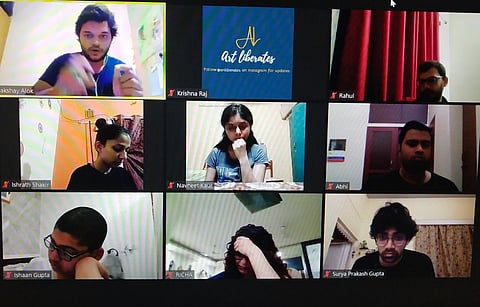

Dimmed lights in an auditorium, the resounding hum of the music, and most importantly, the immersive emotions the audience experiences when an actor is performing at their peak, are some of the most striking aspects of theatre.
With the COVID-19 pandemic demanding physical distancing, however, theatre persons in the country are now adapting to changing times.
An industry, which stands to lose its essence, theatre persons are displaying resilience in rolling out innovative ways to keep the audience engaged.
Dr Anitha Balachander, a theatre actor in Chennai, who is a part of Theater Marina, recounts how the group took inspiration from radio dramas of the 1980s and started their own online version of it.
“Theater Marina has gone into audio plays. These are short plays with a duration of 10-15 minutes. It is uploaded on YouTube. These are similar to radio dramas of the 1980s which were called Oli Nadagam in Tamil Nadu. We have done many audio plays in the last two months,” Dr Anitha says.
Theater Marina uploads its audio plays every Wednesday at 6 pm on YouTube and have been doing so since June this year. One of the challenges, Anitha says, is the “disconnected connect” through the video calls. Rehearsals are more challenging than they used to be before the pandemic.
“The challenge is that people are in different locations and we don’t get to see them. In theatre, during rehearsals, you wait for the cue from another person. There is no body language to judge on a Zoom call and that is quite challenging,” she adds.
Ram Ganesh Kamatham, a playwright and theatre director, told TNM that many generations of theatre people, including veterans and younger entrants, are all adapting to online performances and workshops through Zoom, Facebook and other streaming platforms. Ram Ganesh’s hit comedies include Square Root of Minus One in 2002, Dancing on Glass in 2004, S.T.R.I.P in 2008 and Ultimate Kurukshetra in 2011, which won him the Sultan Padamsee Award.
In a positive, he notes that this has resulted in a new sense of community in theatre. “Times zones and place have collapsed," he said. “We have workshop participants in Singapore, Malaysia, Toronto etc.”
But the move to online theatre still has its setbacks. For one, the digital divide has “disproportionately hurt” folk and rural artists, he said. The closure of theatres has also affected freelance and independent artists, including staff, technicians and crew, who rely on regular gigs to carry out their work.
However, he is hopeful that the community will move forward and find new ways to thrive. “We are seeing exceptional resilience and adaptation in the community, even in the face of gloom and doom all around.”
Krishna Raj, a 31-year-old actor with the Bengaluru-based theatre group Art Liberates, has started theatre workshops online since the last two months. Soon after the lockdown, members of his theatre group, just like several others in the country, were suddenly out of work.
Krishna and his colleague Akshay Alok decided to start the series of workshops titled 'Art Liberates' in order to keep the training going.
“What is the alternative to theatre? This was a question asked a lot by a lot of people. A lot of people wanted to train under us. So we started converting all exercises and rehearsals into online format. We had to change the approach to theatre. We came together and rewrote the entire syllabus, and ways of teaching,” Krishna says.
Krishna and Akshay decided to finetune their training methods. There are different theatre training games which are taught to students and these, Krishna says, are best done in person.
“We have exercises which will help an audience believe that the actor has lived that experience. Ideally, we meet the person and show them how it is done. But now if there is a monologue that requires a person to show grief, we ask them to think of situations they were in which brought that out. We ask the students to talk to each other about their experiences in life, so they can observe the emotions on each others’ faces. The challenge is doing it online. Hence, we ask them to think about how they felt grief or anger or sadness or even joy,” he adds.
Art Liberates conducts online theatre workshops at two levels. A seven-day course for beginners spanning 14 hours in total and an advanced course. This advanced workshop continues for 10 more days and an additional eight days on weekends.